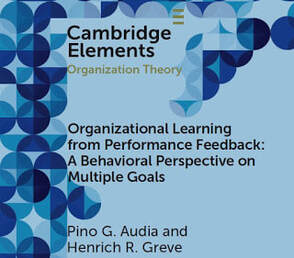 Organizations have goals, and members of organizations try to meet those goals – especially if they are managers. This is obvious, but what has been less obvious is what level of performance on each goal they aspire to meet, and how they react to falling short of this level or exceeding it. Performance feedback theory is a body of research looking at this issue, starting with the classic book “A Behavioral Theory of the Firm” by Cyert and March and continuing with a long string of research articles, nearly all of them following “Organizational Learning from Performance Feedback” written by me. The basics are well known by now. Firms – and people – learn how to aspire from their own past and from others like them. They do not try to improve when doing better than the aspiration level, but when doing worse they will sometimes try hard to improve, and at other times go rigid. When they have multiple goals, it is often possible to find out which goal is more important and is addressed before the others. The long string of repeated findings are typical of research that has captured an important piece of reality. So why is there a new book now, “Organizational Learning from Performance and Aspirations,” by Pino Audia and myself? Because researchers are different from the firms we study. When things go well we wonder what else we can do, and how to improve. The answer, we think, is that there are quite a few things that are missing or can be fixed in this research. In the book we go into detail, but here are some of the leads to what we think can and should be done so that this research – which we think is still at its adolescent stage – can grow up. First, take into account that individuals have goals too, and often these are simply to feel good about themselves. This is a major problem for self-improvement, and also for organizations that rely on managers to acknowledge that low performance is a problem that needs to be fixed. Managers who self-enhance will ignore warning signs. When does this happen, and what are the consequences? Second, acknowledge that organizations and individuals do not just have one or possible two goals, but are often surrounded by multiple goals. They need to pick which one(s) to address, and it is not simply a matter of checking which goals are most consequential and show the lowest performance. In particular, hierarchies influence which goals matter most, and self-enhancement complicates things too. Third, look to the organizational environment as a source of goals that the organization may not voluntarily adopt, but may be forced to adopt because powerful others want it to or, almost the opposite process, may be led into by managers who perform poorly on their main goals but discover environmental goals that they do well on and can use to impress their superiors. Fourth, order our thinking about performance feedback to take into account all the levels of decision-making in organizations. Individual managers matter, organizational units matter, the organization as a whole is important, and the environment sets the stage. In the book, we develop these threads of ideas further and try to make a wide set of proposals of research that can be pursued. We hope you find it useful and inspiring! Audia, Pino G. and Henrich R. Greve. 2021. Organizational Learning from Performance and Aspirations: A Behavioral Perspective on Multiple Goals. Cambridge, UK: Cambridge University Press. Comments are closed.
|
Blog's objectiveThis blog is devoted to discussions of how events in the news illustrate organizational research and can be explained by organizational theory. It is only updated when I have time to spare. Archives
May 2024
Categories |
 RSS Feed
RSS Feed